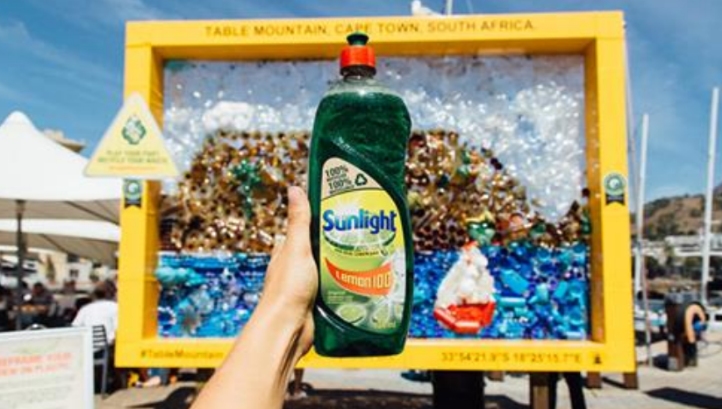Unilever has launched a fully recyclable plastic bottle made from 100% recycled content under its soap brand Sunlight, marking a first for the consumer goods firm’s South African arm.

Unilever has been incorporating recycled plastics into its packaging since 2013
Launched late last week, the recycled bottles are now used to house all 750ml and 400ml packs of Sunlight washing up liquid sold across Unilever’s South African market, with plans to roll them out across other countries which sell Sunlight in the pipeline. They are made from a mixture of both of pre and post-consumer (PCR) PET.
Unilever has been incorporating recycled PET in the Sunlight bottles since 2013, when their recycled content ratio stood at 25%. This was increased to 50% in 2015 and 100% for a trial run of bottles in 2018.
The company claims that it has taken several years to reach a market-scale launch for the fully recycled bottles due to challenges in securing a consistent supply of high-quality recycled materials. A further obstacle was the need to “rigorously” test the new bottles to ensure they comply with industry health, safety and strength standards.
It is now working to source 100% recycled plastic for its Sunlight washing up liquid refill packs, and to incorporate this plastic in a way which maintains recyclability. The new refill packs will be trialled during the first half of 2019, with a market-scale roll out earmarked for 2020.
Unilever has claimed that the launch of the Sunlight bottles will not only serve to reduce its own carbon and plastics footprint, but to engage consumers with sustainability and encourage them to recycle.
“As the number one selling dishwashing liquid in South Africa, we believe Sunlight has a responsibility to lead the agenda in sustainability,” Sunlight’s brand manager Nobuhle Ngubane said.
“We want to inspire consumers to play their part by recycling and choosing more sustainably-focused products.”
Unilever is encouraging consumers to make plastics pledges and to share photos of them using and recycling the bottles on social media, under the hashtag #SunlightPlayYourPart.
A new life for old plastics
Unilever first began using recycled materials in its plastic bottles back in 2013 and has committed to increasing the recycled plastic content in its packaging to at least 25% by 2025.
As of 2017, more than 4,800 tonnes of post-consumer PCR plastic has been used in Unilever’s plastic bottles – largely in the form of high-density polyethylene (HDPE) and PET.
This is largely due to the fact that Unilever has introduced individual product lines which use recycled content exceeding the 25% collective target. Bottles of Knorr salad dressing in South Africa consist of 35% recycled PET, while Cif bottles in Argentina now contain 50% recycled PET, and the company’s Love Beauty Planet range of beauty products is housed in 100% recycled packaging.
Other companies in the consumer goods space are also moving to incorporate more PCR plastics in their packaging, in tandem with Unilever. They include the likes of SC Johnson, which recently unveiled Windex Vinegar bottles made from 100% beach plastics; Ecover, which offers 50% ocean plastic bottles for its washing up liquid and Procter & Gamble, which uses beach plastic to make packaging for its Head and Shoulders and Fairy brands.
Sarah George
